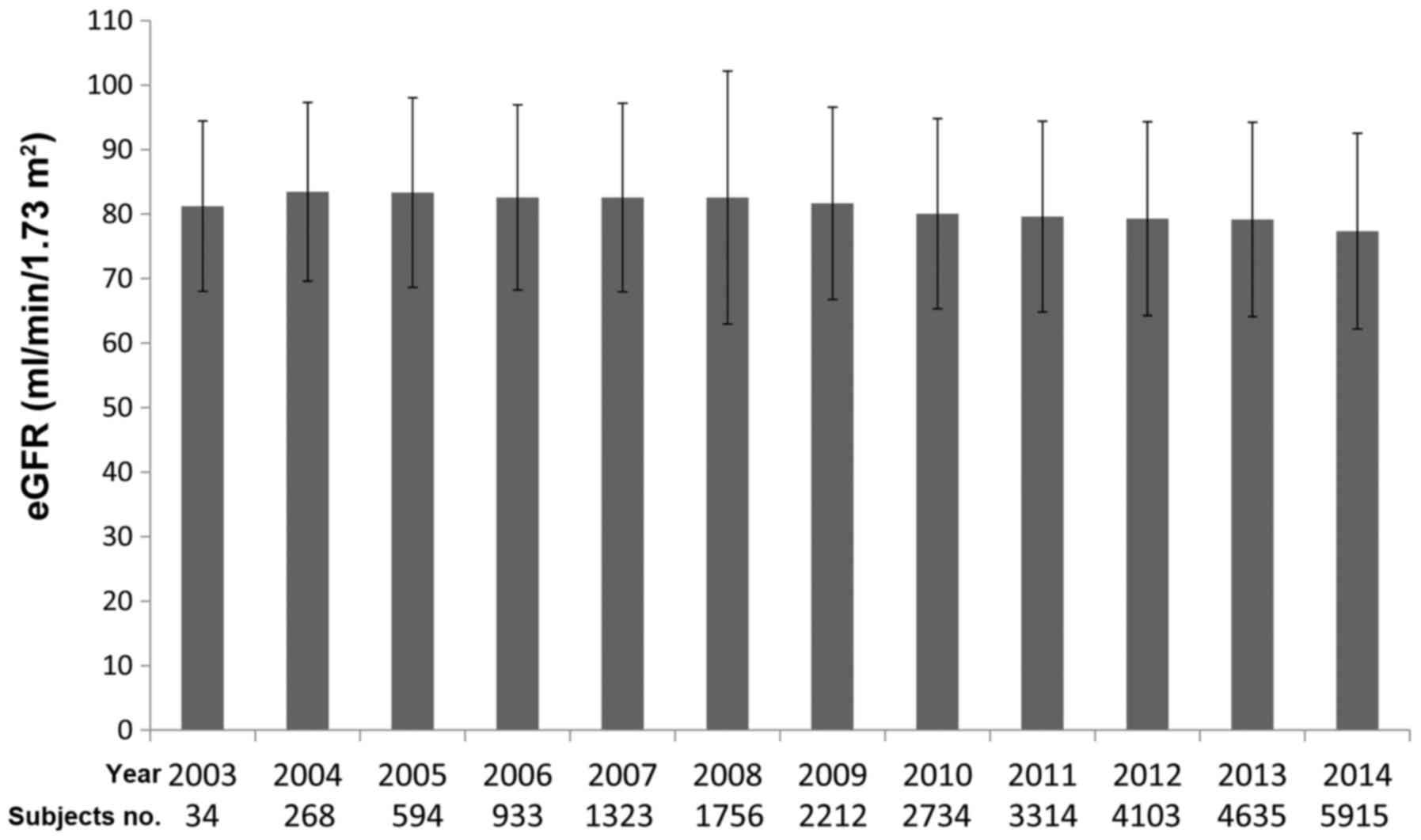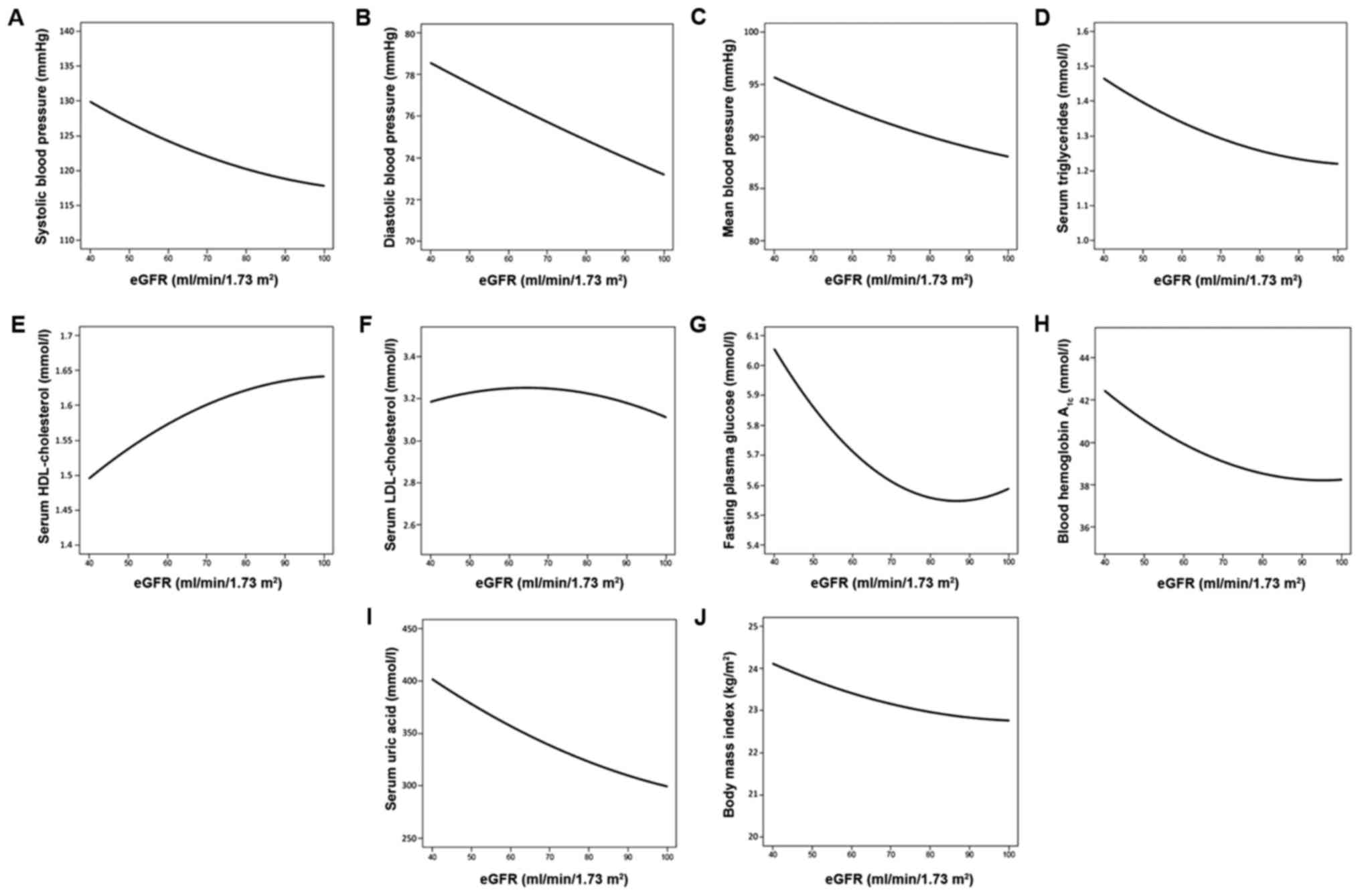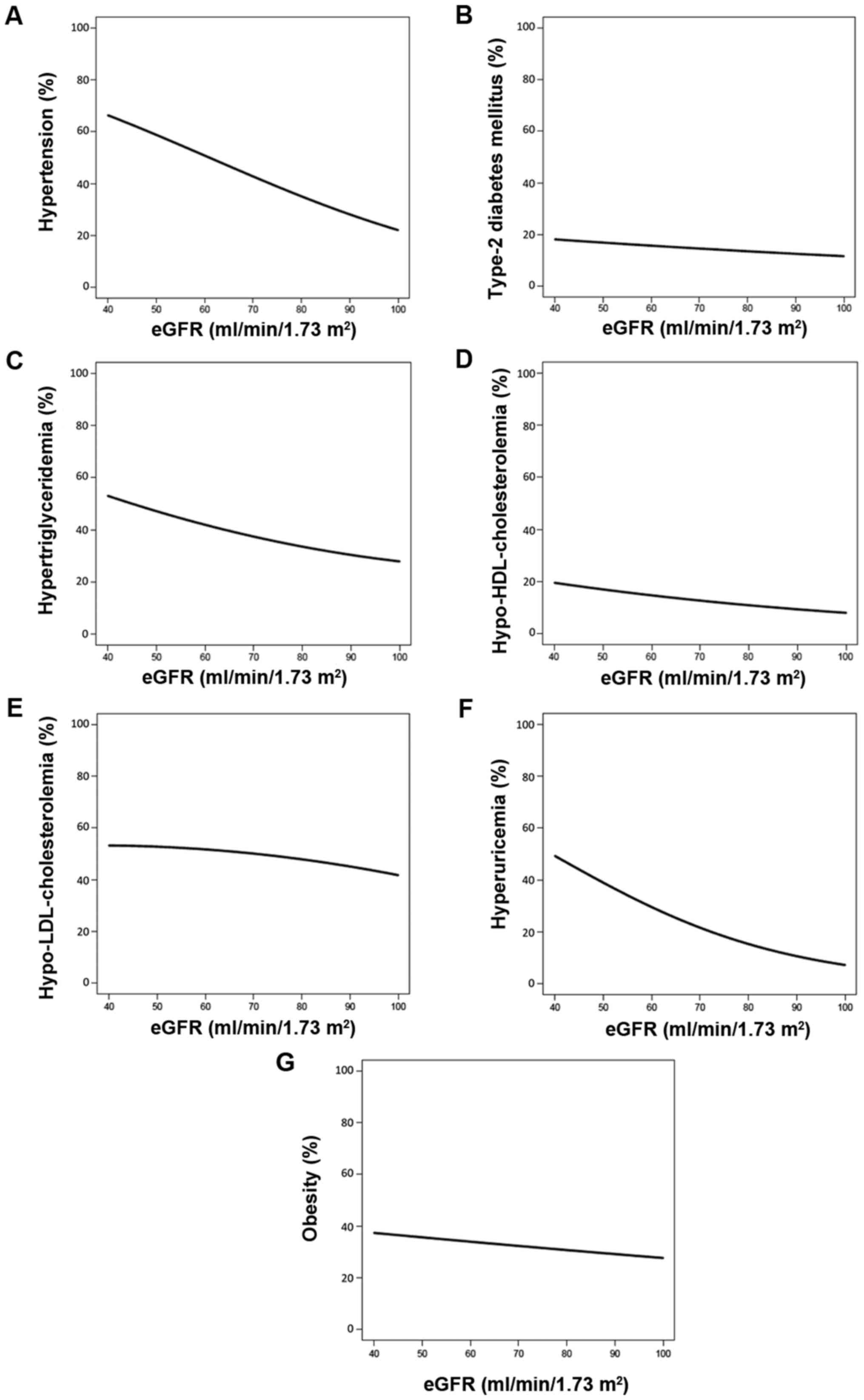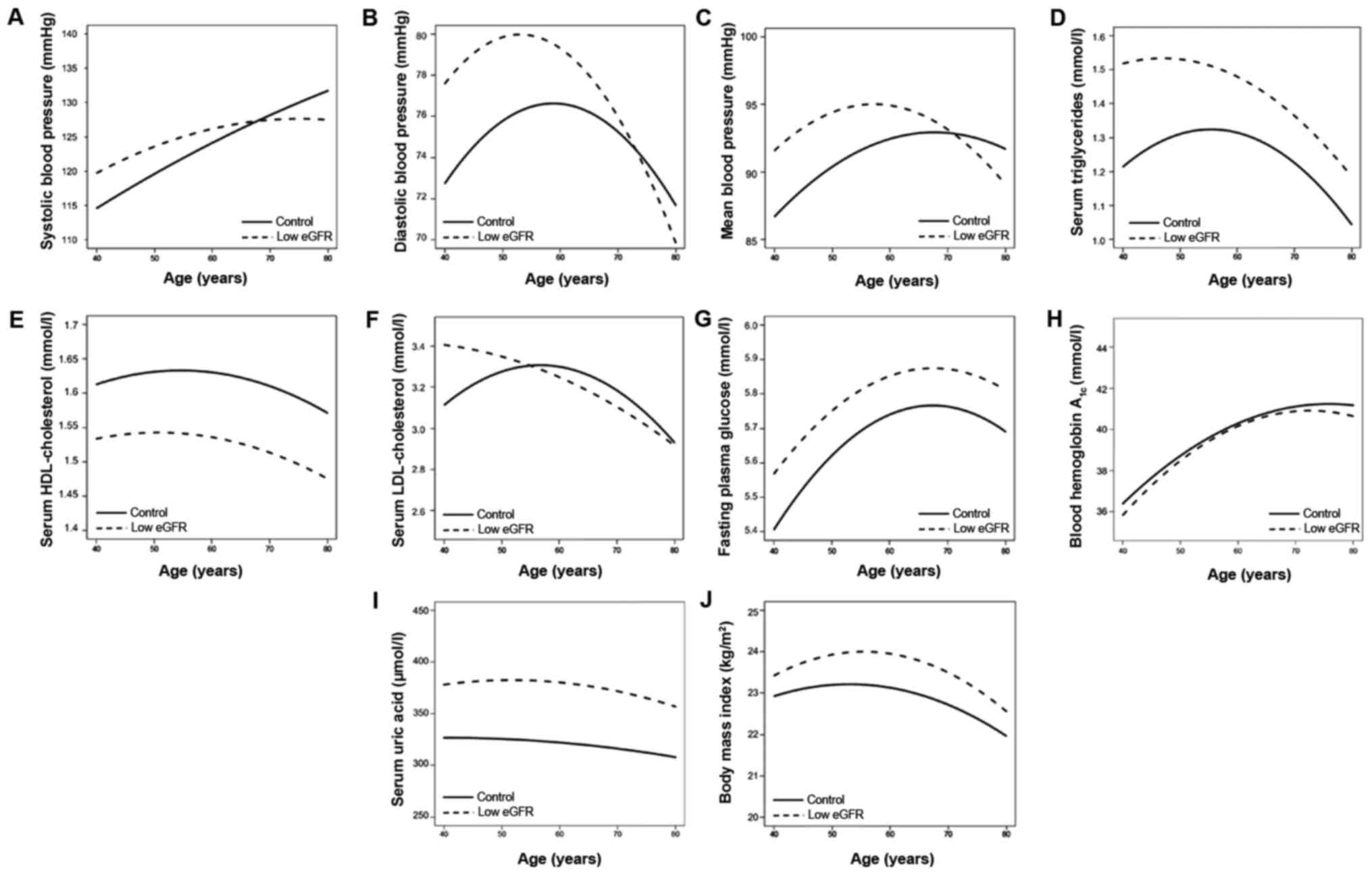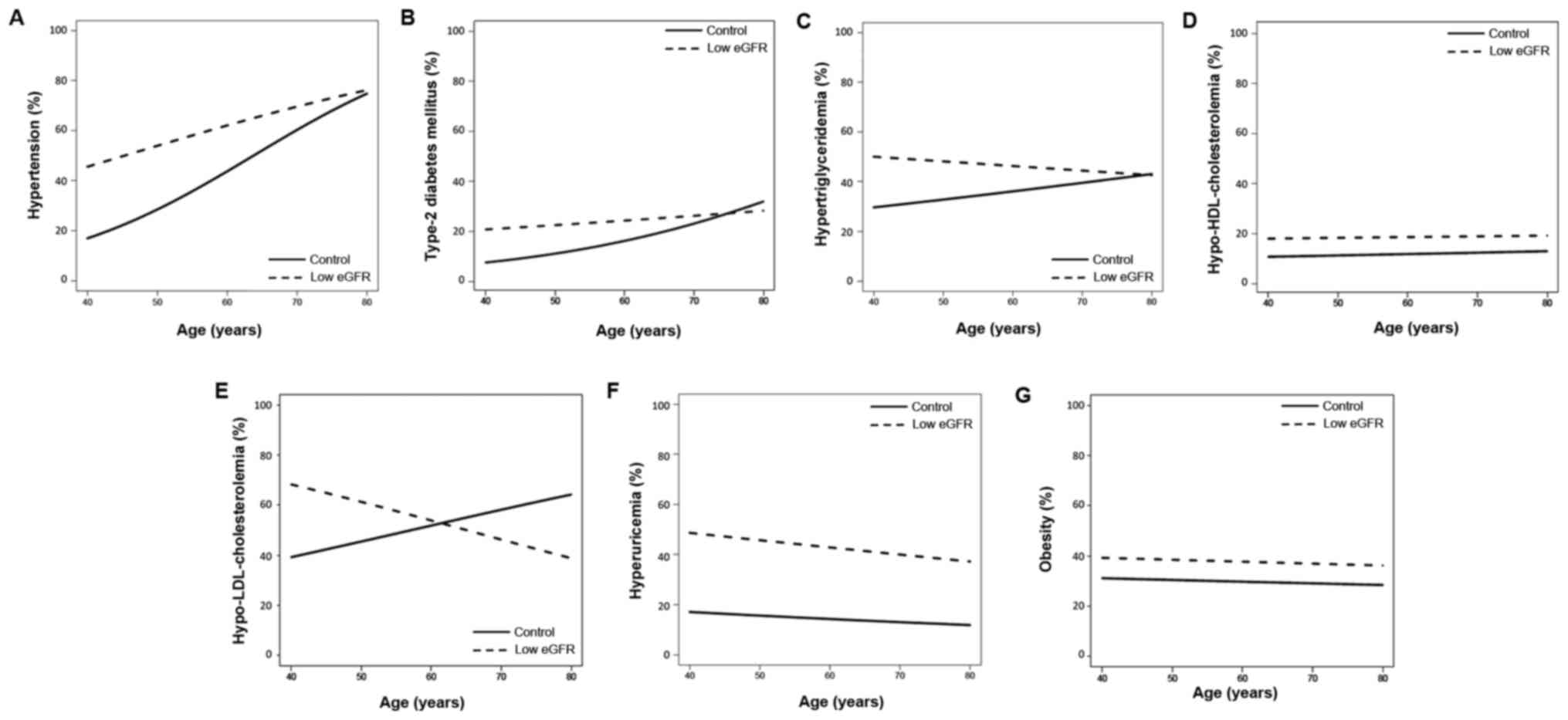|
1
|
National Kidney Foundation, . K/DOQI
clinical practice guidelines for chronic kidney disease:
Evaluation, classification, and stratification. Am J Kidney Dis.
39:(Suppl 1). S1–S266. 2002.PubMed/NCBI
|
|
2
|
Sugiyama H, Yokoyama H, Sato H, Saito T,
Kohda Y, Nishi S, Tsuruya K, Kiyomoto H, Iida H, Sasaki T, et al:
Committee for Standardization of Renal Pathological Diagnosis;
Committee for Kidney Disease Registry; Japanese Society of
Nephrology: Japan Renal Biopsy Registry and Japan Kidney Disease
Registry: Committee Report for 2009 and 2010. Clin Exp Nephrol.
17:155–173. 2013. View Article : Google Scholar : PubMed/NCBI
|
|
3
|
Culleton BF, Larson MG, Wilson PW, Evans
JC, Parfrey PS and Levy D: Cardiovascular disease and mortality in
a community-based cohort with mild renal insufficiency. Kidney Int.
56:2214–2219. 1999. View Article : Google Scholar : PubMed/NCBI
|
|
4
|
Mann JF: Cardiovascular risk in patients
with mild renal insufficiency: Implications for the use of ACE
inhibitors. Presse Med. 34:1303–1308. 2005. View Article : Google Scholar : PubMed/NCBI
|
|
5
|
Fox CS, Larson MG, Leip EP, Meigs JB,
Wilson PW and Levy D: Glycemic status and development of kidney
disease: The Framingham Heart Study. Diabetes Care. 28:2436–2440.
2005. View Article : Google Scholar : PubMed/NCBI
|
|
6
|
Selvin E, Ning Y, Steffes MW, Bash LD,
Klein R, Wong TY, Astor BC, Sharrett AR, Brancati FL and Coresh J:
Glycated hemoglobin and the risk of kidney disease and retinopathy
in adults with and without diabetes. Diabetes. 60:298–305. 2011.
View Article : Google Scholar : PubMed/NCBI
|
|
7
|
Moorhead JF, Chan MK, ElNahas M and
Varghese Z: Lipid nephrotoxicity in chronic progressive glomerular
and tubulo-interstitial disease. Lancet. 2:1309–1311. 1982.
View Article : Google Scholar : PubMed/NCBI
|
|
8
|
Bakris GL, Williams M, Dworkin L, Elliott
WJ, Epstein M, Toto R, Tuttle K, Douglas J, Hsueh W and Sowers J:
National Kidney Foundation Hypertension and Diabetes Executive
Committees Working Group: Preserving renal function in adults with
hypertension and diabetes: A consensus approach. Am J Kidney Dis.
36:646–661. 2000. View Article : Google Scholar : PubMed/NCBI
|
|
9
|
Yamada Y, Matsui K, Takeuchi I, Oguri M
and Fujimaki T: Association of genetic variants with hypertension
in a longitudinal population-based genetic epidemiological study.
Int J Mol Med. 35:1189–1198. 2015.PubMed/NCBI
|
|
10
|
Yamada Y, Matsui K, Takeuchi I, Oguri M
and Fujimaki T: Association of genetic variants of the α-kinase 1
gene with type 2 diabetes mellitus in a longitudinal
population-based genetic epidemiological study. Biomed Rep.
3:347–354. 2015.PubMed/NCBI
|
|
11
|
Yamada Y, Matsui K, Takeuchi I and
Fujimaki T: Association of genetic variants with dyslipidemia and
chronic kidney disease in a longitudinal population-based genetic
epidemiological study. Int J Mol Med. 35:1290–1300. 2015.PubMed/NCBI
|
|
12
|
Yamada Y, Matsui K, Takeuchi I and
Fujimaki T: Association of genetic variants with coronary artery
disease and ischemic stroke in a longitudinal population-based
genetic epidemiological study. Biomed Rep. 3:413–419.
2015.PubMed/NCBI
|
|
13
|
Matsuo S, Imai E, Horio M, Yasuda Y,
Tomita K, Nitta K, Yamagata K, Tomino Y, Yokoyama H and Hishida A:
Collaborators developing the Japanese equation for estimated GFR:
Revised equations for estimated GFR from serum creatinine in Japan.
Am J Kidney Dis. 53:982–992. 2009. View Article : Google Scholar : PubMed/NCBI
|
|
14
|
Kanazawa M, Yoshiike N, Osaka T, Numba Y,
Zimmet P and Inoue S: Criteria and classification of obesity in
Japan and Asia-Oceania. Asia Pac J Clin Nutr. 11(s8): S732–S737.
2002. View Article : Google Scholar
|
|
15
|
Cheng J, Edwards LJ, MaldonadoMolina MM,
Komro KA and Muller KE: Real longitudinal data analysis for real
people: Building a good enough mixed model. Stat Med. 29:504–520.
2010.PubMed/NCBI
|
|
16
|
Gibbons RD, Hedeker D and DuToit S:
Advances in analysis of longitudinal data. Annu Rev Clin Psychol.
6:79–107. 2010. View Article : Google Scholar : PubMed/NCBI
|
|
17
|
Maschio G, Oldrizzi L, Marcantoni C and
Rugiu C: Hypertension and progression of renal disease. J Nephrol.
13:225–227. 2000.PubMed/NCBI
|
|
18
|
Staessen JA, Gasowski J, Wang JG, Thijs L,
Den Hond E, Boissel JP, Coope J, Ekbom T, Gueyffier F, Liu L, et
al: Risks of untreated and treated isolated systolic hypertension
in the elderly: Meta-analysis of outcome trials. Lancet.
355:865–872. 2000. View Article : Google Scholar : PubMed/NCBI
|
|
19
|
Taal MW and Brenner BM: Renoprotective
benefits of RAS inhibition: From ACEI to angiotensin II
antagonists. Kidney Int. 57:1803–1817. 2000. View Article : Google Scholar : PubMed/NCBI
|
|
20
|
Ljutić D and Kes P: The role of arterial
hypertension in the progression of non-diabetic glomerular
diseases. Nephrol Dial Transplant. 18:(Suppl 5). v28–v30. 2003.
View Article : Google Scholar : PubMed/NCBI
|
|
21
|
Franklin SS: Ageing and hypertension: The
assessment of blood pressure indices in predicting coronary heart
disease. J Hypertens Suppl. 17:S29–S36. 1999.PubMed/NCBI
|
|
22
|
Kasiske BL: Hyperlipidemia in patients
with chronic renal disease. Am J Kidney Dis. 32:(Suppl 3).
S142–S156. 1998. View Article : Google Scholar : PubMed/NCBI
|
|
23
|
Weiner DE and Sarnak MJ: Managing
dyslipidemia in chronic kidney disease. J Gen Intern Med.
19:1045–1052. 2004. View Article : Google Scholar : PubMed/NCBI
|
|
24
|
Hirano T, Furukawa S, Kurokawa M, Ebara T,
Dixon JL and Nagano S: Intracellular apoprotein B degradation is
suppressed by decreased albumin concentration in Hep G2 cells.
Kidney Int. 47:421–431. 1995. View Article : Google Scholar : PubMed/NCBI
|
|
25
|
Thompson M, Ray U, Yu R, Hudspeth A,
Smillie M, Jordan N and Bartle J: Kidney Function as a Determinant
of HDL and Triglyceride Concentrations in the Australian
Population. J Clin Med. 5:352016. View Article : Google Scholar
|
|
26
|
Schaeffner ES, Kurth T, Curhan GC, Glynn
RJ, Rexrode KM, Baigent C, Buring JE and Gaziano JM: Cholesterol
and the risk of renal dysfunction in apparently healthy men. J Am
Soc Nephrol. 14:2084–2091. 2003.PubMed/NCBI
|
|
27
|
Sandhu S, Wiebe N, Fried LF and Tonelli M:
Statins for improving renal outcomes: A meta-analysis. J Am Soc
Nephrol. 17:2006–2016. 2006. View Article : Google Scholar : PubMed/NCBI
|
|
28
|
Su X, Zhang L, Lv J, Wang J, Hou W, Xie X
and Zhang H: Effect of statins on kidney disease outcomes: A
systematic review and meta-analysis. Am J Kidney Dis. 67:881–892.
2016. View Article : Google Scholar : PubMed/NCBI
|
|
29
|
Lin CC, Chen CC, Chen FN, Li CI, Liu CS,
Lin WY, Yang SY, Lee CC and Li TC: Risks of diabetic nephropathy
with variation in hemoglobin A1c and fasting plasma glucose. Am J
Med. 126:1017.e1–1017.e10. 2013. View Article : Google Scholar
|
|
30
|
Liao MT, Sung CC, Hung KC, Wu CC, Lo L and
Lu KC: Insulin resistance in patients with chronic kidney disease.
J Biomed Biotechnol. 2012:6913692012. View Article : Google Scholar : PubMed/NCBI
|
|
31
|
National Kidney Foundation, . KDOQI
Clinical Practice Guideline for Diabetes and CKD: 2012 Update. Am J
Kidney Dis. 60:850–886. 2012. View Article : Google Scholar : PubMed/NCBI
|
|
32
|
Chang AM and Halter JB: Aging and insulin
secretion. Am J Physiol Endocrinol Metab. 284:E7–E12. 2003.
View Article : Google Scholar : PubMed/NCBI
|
|
33
|
Stout RW: Glucose tolerance and ageing. J
R Soc Med. 87:608–609. 1994.PubMed/NCBI
|
|
34
|
Shimokata H, Muller DC, Fleg JL, Sorkin J,
Ziemba AW and Andres R: Age as independent determinant of glucose
tolerance. Diabetes. 40:44–51. 1991. View Article : Google Scholar : PubMed/NCBI
|
|
35
|
Nacak H, van Diepen M, de Goeji MC,
Rotmans JI and Dekker FW: PREPARE-2 study group: Uric acid:
association with rate of renal function decline and time until
start of dialysis in incident pre-dialysis in incident pre-dialysis
patients. BMC Nephrol. 15:912014. View Article : Google Scholar : PubMed/NCBI
|
|
36
|
Mazzali M, Hughes J, Kim YG, Jefferson JA,
Kang DH, Gordon KL, Lan HY, Kivlighn S and Johnson RJ: Elevated
uric acid increases blood pressure in the rat by a novel
crystal-independent mechanism. Hypertension. 38:1101–1106. 2001.
View Article : Google Scholar : PubMed/NCBI
|
|
37
|
Bo S, CavalloPerin P, Gentile L, Repetti E
and Pagano G: Hypouricemia and hyperuricemia in type 2 diabetes:
Two different phenotypes. Eur J Clin Invest. 31:318–321. 2001.
View Article : Google Scholar : PubMed/NCBI
|
|
38
|
Fox CS, Larson MG, Leip EP, Culleton B,
Wilson PW and Levy D: Predictors of new-onset kidney disease in a
community-based population. JAMA. 291:844–850. 2004. View Article : Google Scholar : PubMed/NCBI
|
|
39
|
Cusumano AM, Bodkin NL, Hansen BC, Iotti
R, Owens J, Klotman PE and Kopp JB: Glomerular hypertrophy is
associated with hyperinsulinemia and precedes overt diabetes in
aging rhesus monkeys. Am J Kidney Dis. 40:1075–1085. 2002.
View Article : Google Scholar : PubMed/NCBI
|
|
40
|
Beddhu S, Kimmel PL, Ramkumar N and Cheung
AK: Associations of metabolic syndrome with inflammation in CKD:
Results From the Third National Health and Nutrition Examination
Survey (NHANES III). Am J Kidney Dis. 46:577–586. 2005. View Article : Google Scholar : PubMed/NCBI
|















